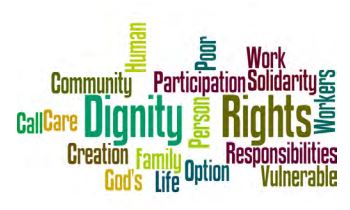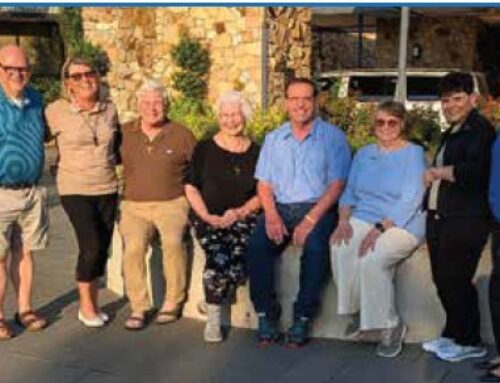(This article originally appeared in the Spring 2019 issue of Tau-USA)
By Carolyn D. Townes, OFS, National JPIC Animator
A sense of community will make them joyful and ready to place themselves on an equal basis with all people, especially with the lowly for whom they shall strive to create conditions of life worthy of people redeemed by Christ. (OFS Rule, Art. 13b)
When we think about Catholic Social Teaching (CST), we tend to think of musty old volumes of writings dating back three centuries that have no impact or effect on our lives today. Nothing could be further from the truth. Catholic Social Teaching is a body of work that affects us today just as much as it did three centuries ago; perhaps even more so. In the simplest terms, CST is an invitation to a relationship with God and with all of God’s creation – God’s people and God’s world. God has always desired a relationship with His people; but He wants us to return the favor. Catholic Social Teaching is the expression of that relationship. It helps us have a right and just relationship with God and God’s creation.

I am reminded of the line from the song from the movie Funny Girl starring Barbra Streisand: “People who need people are the luckiest people in the world.” And yet I know that some people don’t feel so lucky.
Think about all the relationships you have in your life. In order to strengthen and nurture those relationships, you must spend quality time with the people in those relationships. During this quality time, you dialogue, you listen, and you get to know the other person. In the same way, we must spend time with God to get to know Him. From that relationship, we are better able to be with our brothers and sisters – in family, in community, and in fraternity. Catholic Social Teaching is about being in relationship and making sure that relationship is vibrant, healthy and strong.
“Our culture is tempted to turn inward, becoming indifferent and sometimes isolationist in the face of international responsibilities. Catholic social teaching proclaims that we are our brothers’ and sisters’ keepers, wherever they live. We are one human family, whatever our national, racial, ethnic, economic, and ideological differences.” (US Catholic Bishops)
Today, more than ever, we need our communities and fraternities. Biological families are either quite spread apart or dwindling. Loneliness has heightened, and more and more people are hiding behind the screens of their online devices. Research has shown that more people would rather text another person than to sit and talk with them face to face. I know from experience the danger of trying to communicate via texts and emails. Words get misinterpreted and meaning is misunderstood. You cannot convey Justice, Peace and Integrity of Creation tone, and there is no eye contact or body language to gauge.
Building fraternal life in our isolationist society is more important than ever before. How we encounter one another is an essential part of building fraternal or community life. The social doctrine of the Catholic Church teaches us how to be in communion with one another, especially with those who are more vulnerable and on the margins of society. Is someone in your fraternity on the margins of society? Are they more vulnerable because of their socio-economic status? Dialoguing with them will uncover new ways of assisting them to become more vibrant in their lives and in the fraternity. Could this be part of your ongoing formation? Forgo the books for a month or two, and just have some good old-fashioned dialogue. It is said that people don’t care how much you know until they know how much you care. This builds community, and community builds vibrant, healthy fraternal life.



Leave A Comment